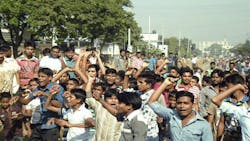140 Factories Shut in Deadly Bangladesh Wage Protest
DHAKA -- At least two people were killed on Monday as thousands of workers protesting at a new minimum wage clashed with police. Almost 140 Bangladeshi garment factories were shut on Monday due to the conflict.
Police said violence erupted at Ashulia, home to Bangladesh's biggest garment plants which make clothing for top Western retailers such as Walmart, in the industrial district of Gazipur north of Dhaka.
Witnesses said two workers died after police opened fire on laborers as they exited the GMS Composite Knitting Industry in Gazipur.
"First, factory authorities beat one of our colleagues and then as we were coming out of the factory in protest, police opened fire. Two workers died and several were injured," a factory worker said.
"The factory authorities dragged several of the injured workers inside the plant. We don't know what happened to them," said the worker, who requested anonymity for safety reasons.
A spokesman for Enam Medical College where one of the bodies were kept said the male worker had a bullet wound in his neck. Police confirmed the toll but denied they fired live rounds at the workers. "We suspect they died during a stampede when they were coming out of the factory," said sub-inspector Saiful Islam, adding police only used non-lethal weapons.
The trigger for the new protests was worker unhappiness at the new minimum wage the government has announced for the country's four-million garment workers.
Although the minimum monthly salary for entry-level workers has been raised by 76% to $68 as of December, unions have complained skilled employees have been deprived, while some employers cut food and transport allowances.
The new wages still leave Bangladeshi garment workers as some of the lowest paid in the sector globally.
Industrial police force spokesman Shamsur Rahman said the latest protests drew at least 10,000 workers at Konabari in Gazipur and thousands more in other parts of the district.
Rahman said the new wage scale has angered senior sewing operators who say they are losing out.
Shahidullah Azim, vice-president of the Bangladesh Garment Manufacturers and Exporters Association, said Monday's protests forced closure of 87 factories at Ashulia, 37 at Konabari and around 15 more elsewhere in Gazipur. He rejected the skilled workers' complaints. But union leader Babul Akter said the new pay scales treated many workers unfairly.
"The workers are angry the government has not kept its word to make the new wage effective from November. Skilled workers are not happy because they didn't get the same hike as entry-level workers," he said.
"Besides, in some factories, the new pay scale will lead to a cut in food and transport allowances. In the new scale, the annual increment has been fixed at 5% while workers in many factories already get annual increments of 8%-15%," he added.
The manufacturers' association agreed last week to the new minimum monthly wage following days of unrest in Ashulia and elsewhere which closed hundreds of factories.
While pro-government labor unions have accepted the 76% rise in the minimum wage, left-leaning labour groups have rejected the deal and demanded a $100 minimum.
- Shafiqul Alam, AFP
Copyright Agence France-Presse, 2013
About the Author
Agence France-Presse
Copyright Agence France-Presse, 2002-2025. AFP text, photos, graphics and logos shall not be reproduced, published, broadcast, rewritten for broadcast or publication or redistributed directly or indirectly in any medium. AFP shall not be held liable for any delays, inaccuracies, errors or omissions in any AFP content, or for any actions taken in consequence.
